January is not the best month for a cycle rue. This year the weather is so unusually fine I thought it rather bad to have my Pierce stored up waiting for the fine days.
During my Christmas holidays I had been read-ing D’Alton s History of County Dublin and had mapped out a visit to many of the interesting places mentioned by him. A couple of Sundays ago I made up my mind to have a foray through some of the Finegall territory.
Finegall has preserved its ancient name well. Everyone has heard of the stolid Fingallian, who is so hard to stir up and so difficult to stop when set going.
The dark gloomy afternoons in January do not tend to brighten a person’s spirits and my impressions of the Dublin roads were not of the best as the unpleasant bumping on a stony road in winter is not conducive to the reflective state of mind necessary to the antiquarian mind.
My first stop was Glasnevin. Now the home of the dead ! Formally the busy seat of a great monastic school. One of Ireland’s greatest ancient schools stood here near the Tolka, the huts of the students stood in such clusters near the river as to form a small town.
Finglas was the next place of historic interest. St Patrick visited this place in his journey through Finegall.
Nothing relieves the eye so much as trees in a landscape. When you cross into Finegall you are in a strip of country so decidedly flat as make one feel lonely for a bill to relieve a monotony. There is not a great deal of timber on the road from Dublin ; the land is so fertile that it would not pay to have many woods, where more valuable crops might be grown.
Right along the way I could notice the steady battle of the grass and the tillage right up even to the walls of Dublin.
St Margaret’s was my next stopping place. Round this locality there was a famous abbey in olden times called Donoughmore—I think there is no trace of it at the present time. The old well at St Margaret’s is very interesting. Approached by a broad footway, it is about ten feet square.
The water bubbles up continuously in the centre and flows away in a small stream. Even in the depth of winter the water of this well is several degrees warmer than water in the fields round about. The new church here is very pretty in design, built of limestone, surrounded by a handsome iron paling, the interior is neat and simple in ornamentation like most country churches.
As I came back from the well I heard the sound of boys voices at play in a field some distance off. Riding past the few houses which make up the village—or ” town “as it is tilled locally—I came to the play ground. Hurrah I the lads are hurling. The sight of a hurley stirs up my Gaelic blood. The Hurley has come to be recognised as the badge of Irish lreland. But I bad not expected the Hurley in St Margaret’s. Buail amach i•a-Thomais I These were the first words I heard above the noise of the play. Yes, they have Irish too. Irish and hurling go well together. I did not enter the field but was content to remain a hurler on the fence. A strong merry lot of lads brimming over with life racing to and fro, now charging in front of the goal mouth, to be driven back by the watchful goalkeeper. It was great fun to see some of the wee lads pick out the ball when a big scrummage was on, and make off with it down to the other goal and then to see them scamper away when the big boys came thundering down the field in pursuit.
“What’s he saying at all ?” This remark from a middle-aged man who stood near watching the play. I explained that the lad had said in Irish, ” It was a goal.”
” Well,” he says, ” I don’t know what’s the country comin’ to at all.’ For the last couple of years its all new fangled notions. Nothin but Irish.” ” And don’t you think,” said I, ” that tis only right to speak our own lang*age?” ” Oh I yes certainly ; but you see if all them lads took to talkin’ Irish what would an old chap like me do ?” He said this with such a serious shake of the head, that I could not but laugh.
However I assured him that there was no danger of his being isolated on account of his want of knowledge of Irish as the young fellows would not forget their English by learning Irish.
He entered into a long conversation on the Gaelic Movement and showed a wonderful interest in the working of the League in Finegall. ” It was grand he said over at the Feis in Swords last year to see the bands and the dancing and hear the grand singers and story-tellers. Another place they had all kinds of knitting and lacemaking, and bread and butter, that it would do you good to see.”
The Gaelic League is doing more than spreading the language ? Indeed it is then. Sure only for the ” Irish people” we’d be dead with the lonesome-ness. ‘ fis well I remember the sad weary nights when I was growing up. ” We had no fun at all; we spent our time moseyin round the place in the evening or maybe looking into the fire. ” Why now he says the young people have dancing and singing every other night and the hurling on Sun-days. A great change for the better thanks be to God.” I was delighted to hear all the good and hopeful news he had to tell of the Gaelic movement. Being old he could not turn his hand to the good work, but still his whole heart was with it. He invited me to wait and see the plays which were to be produced in the ald church that evening by the Gaelic branch. I explained that it would be rather late to ride back to Dublin; but I Would have company back he assured me, struck by his enthusiasm I determined to wait and see the Finegall dramatists. Having some time to wait before the commencement of the performance. I crossed over to the old graveyard. This place appears to be very ancient. A ruined church in the very oldest style occupies the centre of the graveyard. Some of the tombstones date back to 1615. On tI’e inside of one of the church walls is an old slab of slate bearing an inscription in Latin, which is almost impossible to decipher, so chipped and worn is it. From the graveyard you have a fine view of the surrounding country. Great tracts of rich grazing land stretch out on all sides, dotted here and there by the black tillage fields ; the farmhouses are not so numerous as one would wish to see on an Irish landscape. Tillage is going ahead again in this district, more land has been broken during the last few years. Ploughing matches are being held and land is being broken which has not felt the touch of the plough within the memory of living men. Very Good. When Finegall returns to tillage it will be a busy and prosperous country side.
It must be time for the plays now. One does not feel an hour passing when he commences to day dream.
The Gaels of St Margaret’s are more fortunate than others in having a fine hall for their classes and entertainments. The old Chapel was handed over to Irish Ireland on the completion of the pre-sent pretty edifice.
The old hall was filled with a good humoured audience, such as one finds in a country place. Under the gay laughing chat, there ran a sup-pressed feeling of expectancy, and why not ? Their own people were turned actors for the first time.
The actors on the bill were—Mr H Thibbs, Master J Duke, Miss M MacDonnell, Mr M McDon-nell, Mr T Colman, P Flanagan, and Mr P Moran. The plays were ” Tbe Gombeen Mao,” ” Charity,” and ” The Stay. at Home.” These tbree plays were written by Mr Phibbs. We have here the re-markable fact of a Gaelic League Branch in a country district actually rising and producing a drama for themselves.. What a wonderful driving force is the Irish Language ?
Well, now, here is the Gombeen Man. A most greedy looking little fellow who sits gloating over his ill-gotten gains in real miserly fashion. This little play in two acts is full of life, the action never ceases to the end, which comes in a most tragic manner by the Gombeen- Man committing suicide when his misdeeds have been discovered. A very good touch of comedy was the corning of a leprechaun to the Gombeen Man’s room. This young gentleman created roars of laughter by his antics. He completely terrified the poor Gombeen Man and cleared him out. The acting by Master J Duke was splendid. This young fellow has got a real good idea of what one would expect a leprechaun to do, iind if I should meet him on the Dub; lin road I would be holding him up for his money. With a little more attention to scenery and some minor points in the-acting, ” The Gombeen Man” should take well.
The second play was thd best of the three. The acting of the part of the servant girl by Miss M’Donnell deserves very great credit. Nature was striven-for and wonderfully brought -out. After some practice, Miss M’Donnell should become a clever actress. The other parts were very well filled. The returned American of Mr H Phibbs, and the uncle, M M`Donnell, being very well done and creating some very enjoyable situations. .
“The stay at borne” was not up to the level of the two others, but it was of a different type and was good contrast.
Let us hope that this little company will continue to work on the stage and try and express the life 01,:t exists around it in the towns and country sides of Finegall. There is grere for Finegall. Such was my summing up of my days pleasure. People such as these mean to succeed, They have learned the great lesson which the League preaches wherever it goes—Sinn Fein, Sinn Fein!
There are happy Sunday evenings in Finegan, pleasant dances and tea parties, homely Irish gatherings, which alas, had almost gone before the blast of Angli-cization.
The dark, dreary road to town had now no terrors for me, and I bumped along right joyously, for the mind has a wonderful control over the body, and I had such very pleasant memories of Finegall and a strong fervent belief that the Fingallians are one of our grandest types of people working in the cause of Caethleen Ni Hualacain. A CITY TRAMP.
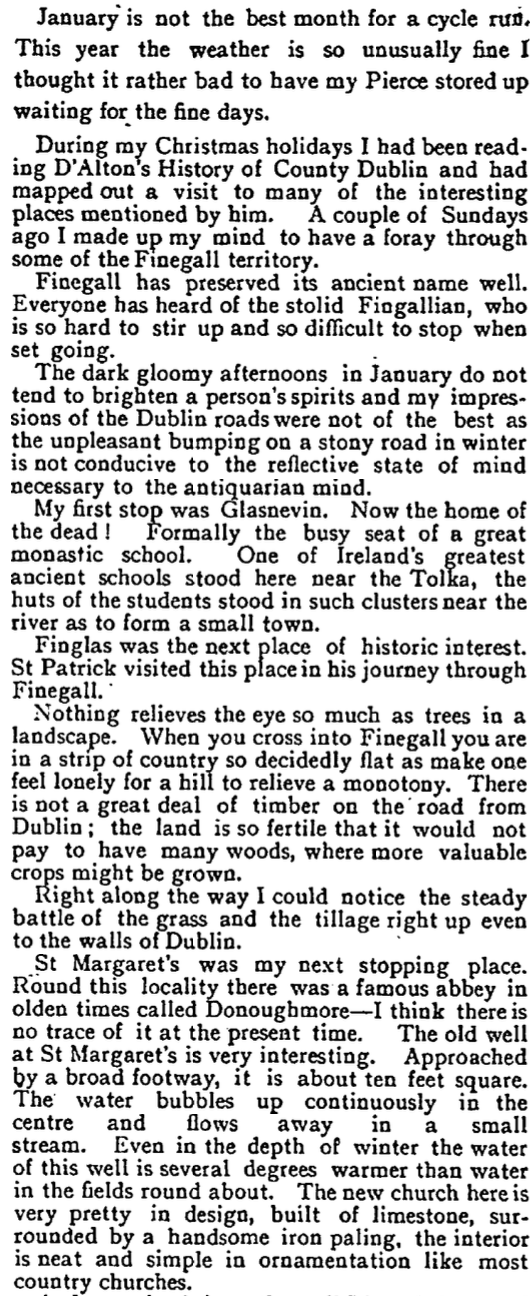
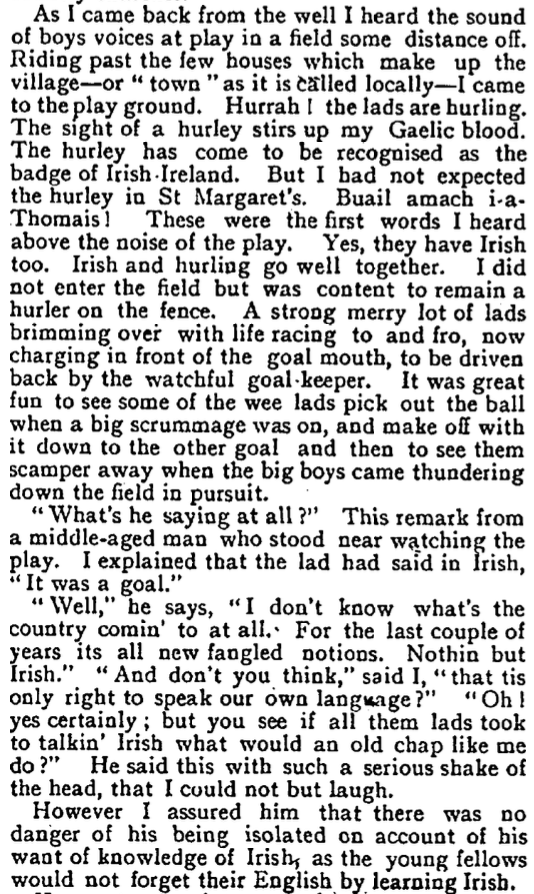
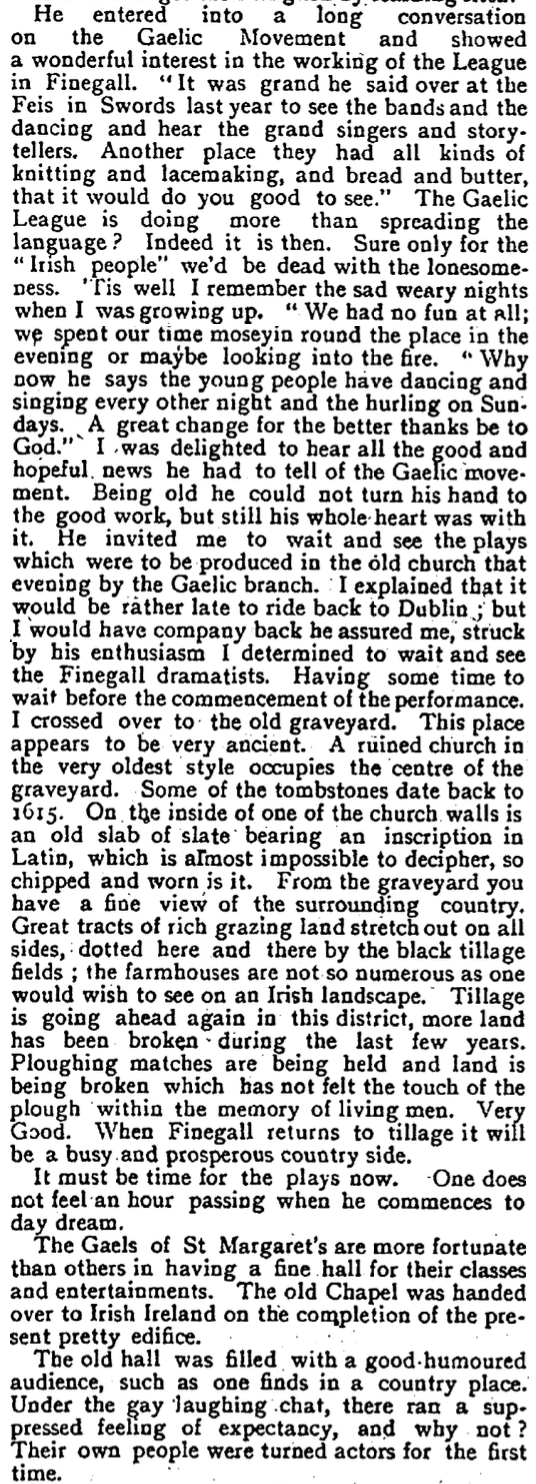
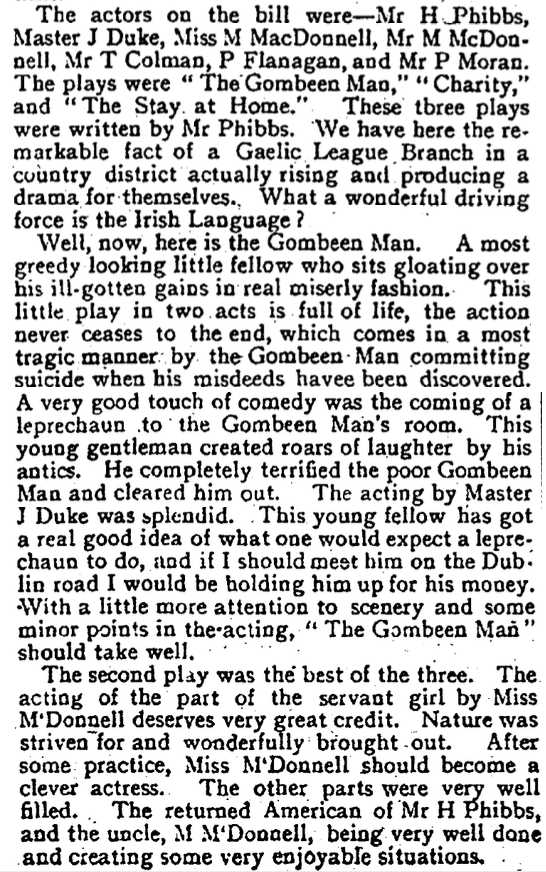
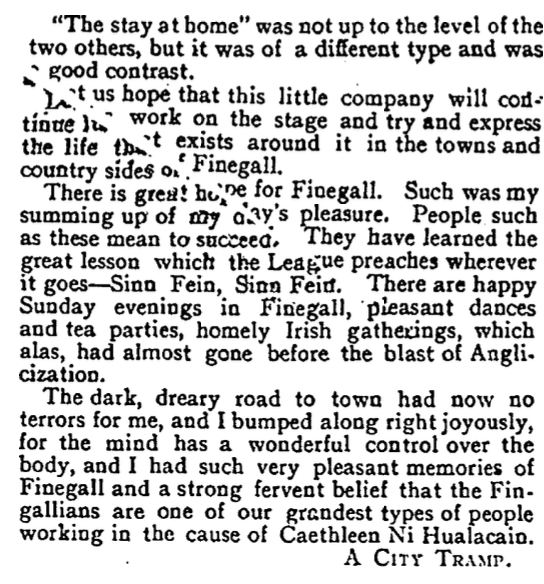


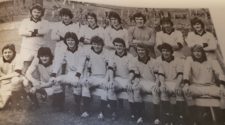
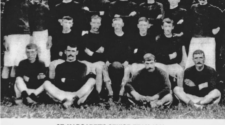
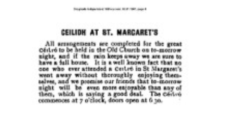



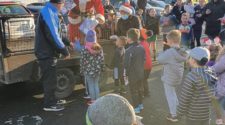
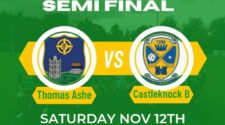
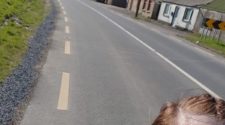

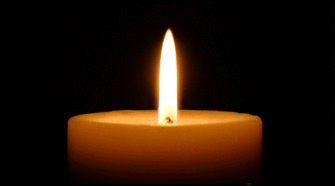
No Comment